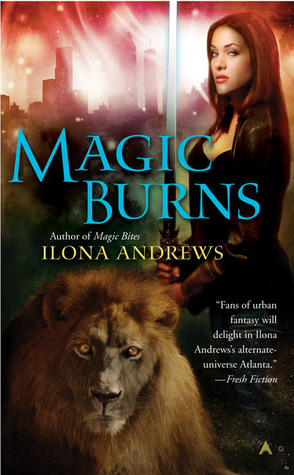Review: Ilona Andrews’s “Magic Burns”
by Miles Raymer
Poor Kate Daniels! She can’t even enjoy a fried chicken wing or a cup of coffee without some hellraising demon or malevolent god showing up to ruin her day. If Magic Bites is the lure for this series, Magic Burns is most certainly the hook. Ilona Andrews’s characters continue to entice and impress with a level of depth uncommonly found in genre fiction, and the worldbuilding also remains solid in this second installment. For better or worse, I think I will stick with this series to the very end (which is saying something given that the ninth book was just released).
Magic Burns is an improvement on its predecessor in a few ways, the most important of which is that it retains the strong characters I enjoyed in the first book while introducing several new and promising ones. We still get the magical-mystery-that-our-hero-must-solve dynamic at the center of the story, but Andrews also drops tantalizing hints about Kate’s personal history that fueled my curiosity and left me wanting more, all while being thoroughly entertained by the supernatural mischief that in constantly fucking up her life. Andrews is a master of sexual tension who knows how to tease the reader, never giving Kate what she so desperately craves. Even better, Kate lives out this predicament for very good reasons that cohere nicely with the rules of the fantastical world Andrews has built for her, thus preventing her sexual frustration from seeming manufactured and inorganic.
The same can be said of the overarching conflict in this book, which draws its playfulness from Andrews’s integration of her magic vs. tech world with the history of mythology. Although Irish and Arthurian mythology wield the biggest influence in this particular tale, we get the feeling that Andrews will draw liberally from any and all mythological traditions as the series progresses. It remains to be seen if she can weave these disparate threads into a consistent and intelligible magic-verse, but so far so good. I also think Andrews needs to reveal a bit more about the waning technological aspects of this world, which feel somewhat underdeveloped in contrast to the expansiveness of the magical landscape. Hopefully this weakness will be dealt with in later volumes.
Beyond the quippy humor and clever plot-pieces, Andrews proves sensitive to the greater moral conflicts that inhabit all good literature. Thoughtful messages about the challenges of poverty, proper parenting, adolescent infatuation, adult love, the nature of heroism, and the dangers of uninformed worship can all be found here. We even get Kate’s personal definition of evil, which would find itself at home in any respectable introduction to ethics: “Evil is striving to an end without regard for the means” (238).
There seems to be an endless list of things to like about this series, but Kate is at the heart of it all. Without her, even this deeply imaginative world would feel lifeless. Andrews has crafted a protagonist as likable and relatable as Harry Potter, as serious and deadly as Ma Joad, and as quick-witted and roguish as Han Solo. Kate is a badass, plain and simple. But she’s also neither plain nor simple, which is what makes her so alluring. I am dying to know more about her backstory and future adventures, as well as to see what happens when she finally loses herself in the carnal pleasures she often longs for but never receives.
Book three, here I come!
Rating: 8/10
